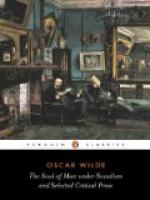And it is to be noted that it is the fact that Art is this intense form of Individualism that makes the public try to exercise over it in an authority that is as immoral as it is ridiculous, and as corrupting as it is contemptible. It is not quite their fault. The public has always, and in every age, been badly brought up. They are continually asking Art to be popular, to please their want of taste, to flatter their absurd vanity, to tell them what they have been told before, to show them what they ought to be tired of seeing, to amuse them when they feel heavy after eating too much, and to distract their thoughts when they are wearied of their own stupidity. Now Art should never try to be popular. The public should try to make itself artistic. There is a very wide difference. If a man of science were told that the results of his experiments, and the conclusions that he arrived at, should be of such a character that they would not upset the received popular notions on the subject, or disturb popular prejudice, or hurt the sensibilities of people who knew nothing about science; if a philosopher were told that he had a perfect right to speculate in the highest spheres of thought, provided that he arrived at the same conclusions as were held by those who had never thought in any sphere at all—well, nowadays the man of science and the philosopher would be considerably amused. Yet it is really a very few years since both philosophy and science were subjected to brutal popular control, to authority—in fact the authority of either the general ignorance of the community, or the terror and greed for power of an ecclesiastical or governmental class. Of course, we have to a very great extent got rid of any attempt on the part of the community, or the Church, or the Government, to interfere with the individualism of speculative thought, but the attempt to interfere with the individualism of imaginative art still lingers. In fact, it does more than linger; it is aggressive, offensive, and brutalising.




